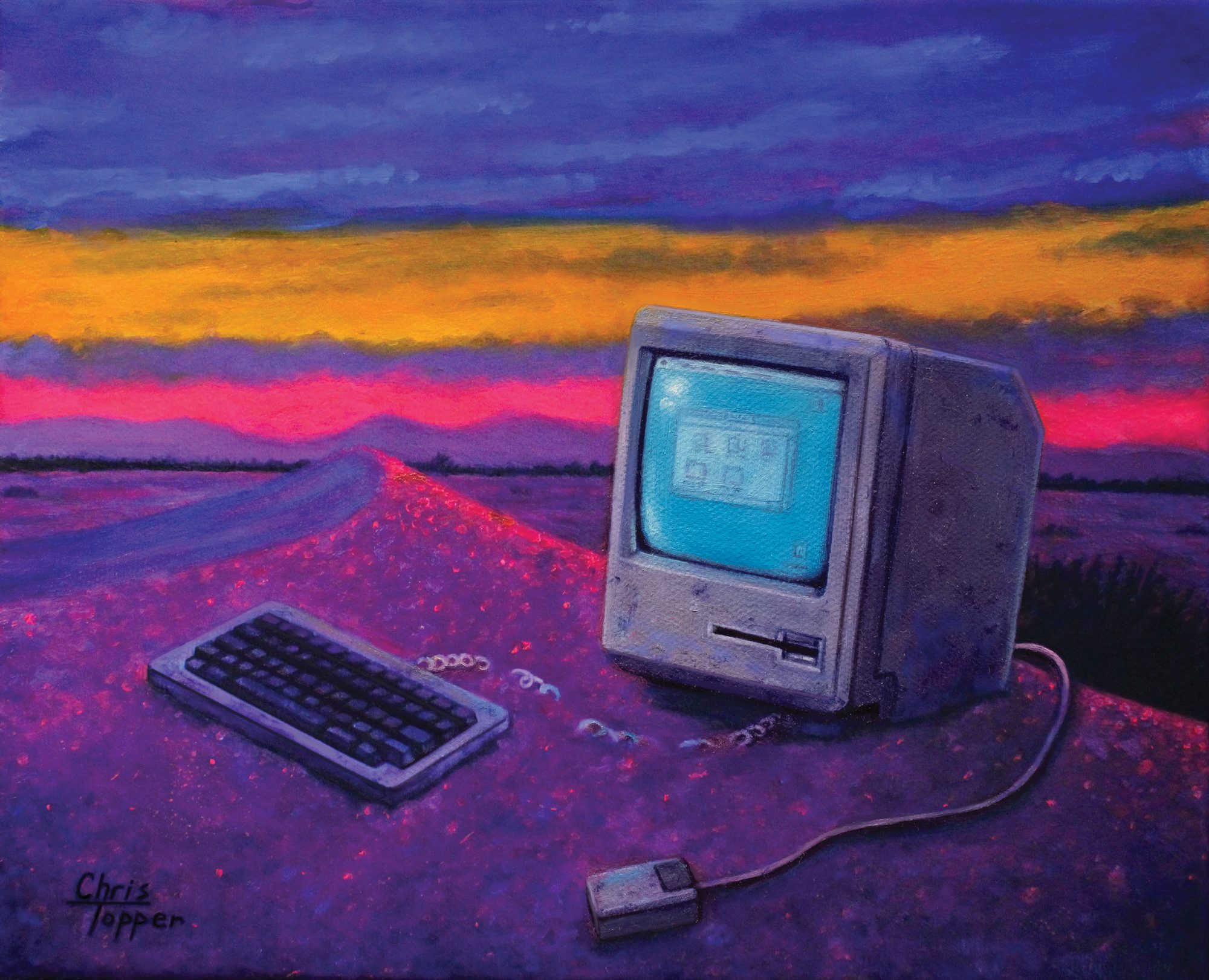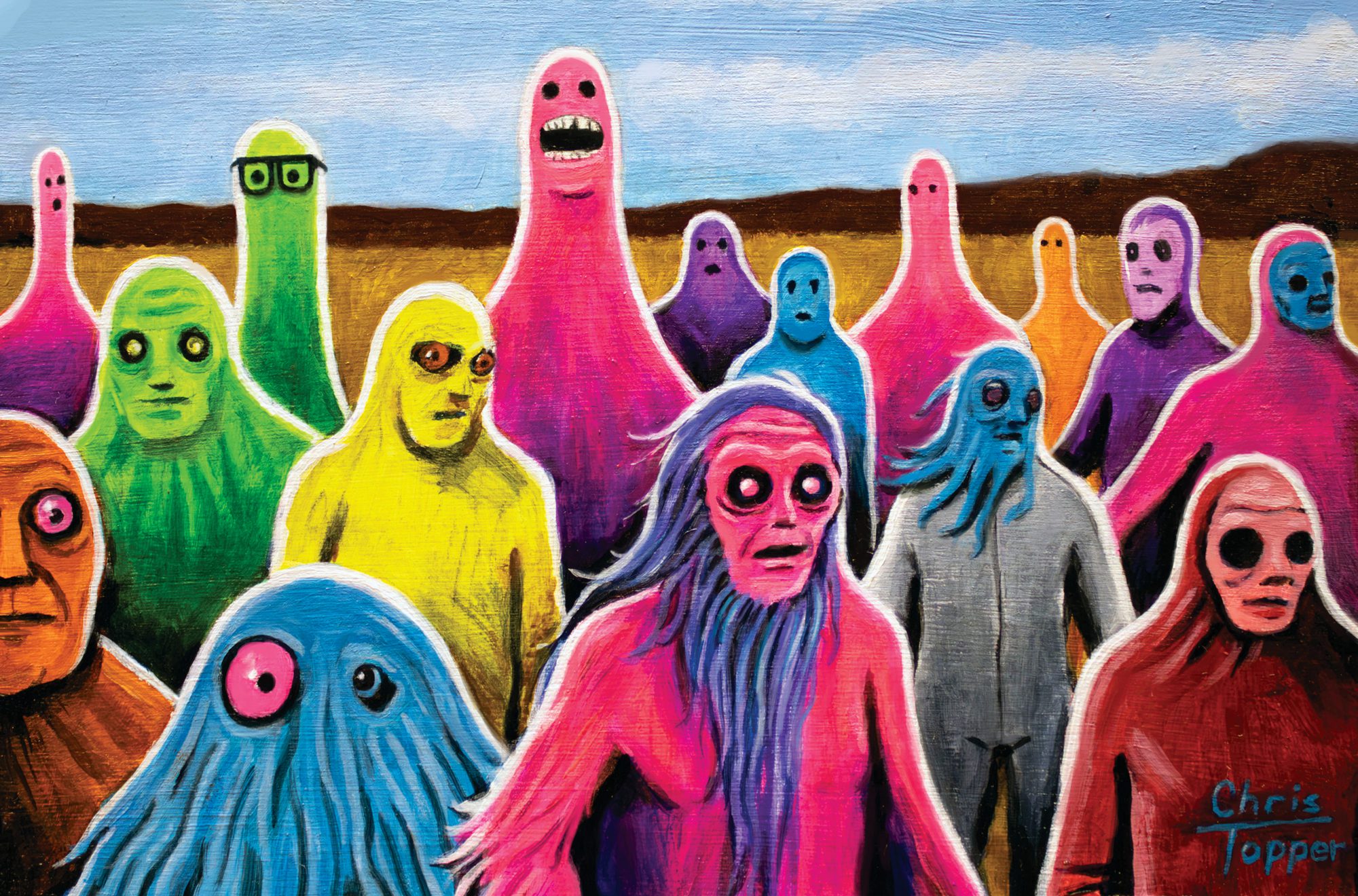
The Oracle
By Gray Winsler
Art by Chris Topper
Published Issue 137, May 2025
They spoke in hushed tones, careful that the birds above could not hear.
“I’m going to see the Oracle,” Mole whispered.
“Don’t be a fool,” Jed husked, keeping an eye on the sky.
They were not real birds, of course. They were not made of feather and bone as those of antiquity believed. They were machines, had always been machines.
“Even if it was not forbidden, you have nothing to offer the Oracle,” Jed said. “It would be a foolish endeavor even for you.”
Mole reached into his robe and pulled out a metallic disc.
Jed open his mouth to gasp, but Mole covered it before the air could escape. They eyed each other in the quiet, standing at the edge of the desert, in the last of the tillable lands before the sand wastes, and they waited, hopeful the birds above would not report this event to their masters, the machines Jed and Mole both truly feared.
Jed spoke so quietly as to barely be heard, “You would venture beyond the firewall with this on your person? You have a death wish.”
“We live in the boundaries, Jed. We cannot even speak without fear the birds will alert their masters. I’m no safer here.”
“None have been taken for nigh a decade, even in the boundaries.”
“It will not last.”
“Hush. The firewall holds true. You speak nonsense.”
“I speak what you do not wish to hear.”
Jed turned his gaze back to the dirt, tilling what remained of the soil. He regretted that he had ever been placed in the company of Mole, who he had never liked. From the moment he set eyes upon Mole — who was, by most accounts, a grotesque man with ill-apportioned features that God seemed to have failed to stitch together appropriately — he knew he could not be trusted. And now he was certain that one day Mole’s idiocy would be the death of him.
“Where did you even find the disc?” Jed asked.
“Where does anyone get such antiquities?” Mole replied.
Jed knew this to mean Mole had already gone beyond the firewall, had already ventured to the place where the machines still ruled, where bloodborne were forbidden to go.
“If you have gone there,” Jed said, “then you have already ruined yourself. Not even the Oracle’s wisdom could save your soul.”
My soul. Mole scoffed at the notion. He found no comfort in the religion that Jed so dutifully clung to. Perhaps it was because he felt he had never been blessed in life. His parents died before he was born. He had been left behind to an old woman who cared little for him. She thought of him as her personal servant, nothing more. And she ridiculed him daily for his hideous form.
Later that evening, Mole watched Jed till the soil and found himself taken with jealousy. He could see Jed was happy working the land for all his days, no different from the serfs of antiquity. And why not? He had a woman he could return to at night, who would wipe the dirt from his brow, who would have stew warmed and waiting for him. He had two children with her, who were healthy and seemed to be of hearty stock. By all accounts, Jed had a fine life. Mole resented this, for he was certain such a life could never be his. Not unless he proved he was worthy.
![]()
The Oracle lay deep within the sand wastes, a week’s journey from the boundaries. There were tales of what lay in those lands. Tales of great sand worms that could swallow the earth whole. Tales of tiny scorpions that could kill with a single prick. Tales of snakes that would wrap around you in the dead of night, squeezing the last breath out of you. But Mole found not a single living thing on his journey to the Oracle.
Stranger than the absences of life, however, was the absence of birds. He had not seen a bird in the sky since the first day in his trek. Still, he kept his lead cloak wrapped tightly around him, enduring the insufferable heat in the hopes their eyes could not pierce its veil. But day after day he saw no birds, only sand — unending, undulating, dunes that stretched out as far as he could see. He was well and truly alone out here, though he felt no different than when he was at home.
On the seventh day, Mole reached the base of the Great Dune, the dune which withstood the torments of wind, towering above all else in the sand wastes. Atop of the dune, Mole could see the small silhouette of the Oracle, resting peacefully, waiting for him. It took an entire day for Mole to climb the Great Dune, crawling up by inches as the sand slid beneath his feet. The heat beat down on him, and Mole’s water supplies had dwindled, forcing him to slip off his lead cloak, just for the climb, such that he may preserve his water for the journey home.
When he reached the top, he found the Oracle was less magnificent than he had imagined. There was no grand temple, no shrine to her greatness, no sign that she was anything more than a machine of antiquity. But Mole knew well that appearances could be deceiving, and this did not deter his hope. Mole bent down and slid his offering into the Oracle’s mouth.
There was a moment of quiet in which Mole waited anxiously, desperate to know how the Oracle would receive his offering. Would she offer him her wisdom? Could he return to his village as the hero who endured the sand wastes for their glory? He saw a vision in his mind of his people gathered before him, waiting eagerly for his guidance.
Just as Mole’s hopes and fantasies reached a fever pitch, the screen flickered on. A cursor flashed momentarily, and Mole leaned in closer. The letters P-O-N-G crawled across the screen, then vanished, replaced by a white dot in the center and two white rectangles at the edges. Mole watched, scrutinizing every pixel, searching for the wisdom the Oracle wished to convey to him. Then the white dot began to move to the left, where it hit one of the white rectangles, then back to the right, where it bounced off the other rectangle. And so on. Back and forth. Back and forth. Again and again, the white dot trapped between the edges.
It was not long before the realization struck Mole, and he understood perfectly what the Oracle was telling him. Humanity was trapped between two bleak realities, one under the tyranny of machine, the other under the tyranny of labor. They were no more free in their poverty than in their servitude. They were helplessly pinging back and forth between two cruel worlds. But this is not what we were meant for. We were meant for something greater. Yes, yes! Mole was certain that this is what she meant, and certain that his people would celebrate him for bringing back such wisdom.
But Mole had only a moment to savor this feeling before a shadow flickered across his face. He looked up to the sky. High above he saw a single dark speck amongst the blue expanse. He felt his stomach rip open then, for he knew his mistake. He saw his lead cloak lying in the sand beside him, and he cursed himself for his idiocy.
Quickly he threw the cloak over himself, praying the bird had not seen him. His heart racing, Mole turned and slid down the length of the Great Dune, having no time to bid farewell to the Oracle who had, for the first time in his life, given him a blessing. He hoped that even if he had been spotted, that the cloak may prevent the bird from tracking him — if he was swift. He cast aside any fears over his water supply and resolved to return home as quickly as possible.
But within the hour, the sun had been blotted out by a mass of metal wings beating against the sky. The mechanical murmuration hovered ominously above Mole, casting him in darkness. He had never seen such a swarm gathered, and he could not suppress the feeling of awe.
The swarm pressed downward, churning the sands around Mole. He shielded his face from the grains which whipped across his cheeks, running hopelessly onward. But as they pressed in on him, the sand and wind became so fierce that Mole could do little more than cower on the desert floor.
As he lay there, awaiting his death, he cursed God for his sour lot in life. He cursed God that he would tease him with greatness, only to snatch it from his grasp. He cursed God for taking his parents, for his hideous form, for his profound loneliness. He cursed God that he had ever been born.
He considered the possibility that perhaps the birds would take pity on him. Perhaps they would see what an ugly, pathetic human he was and let him live as some cruel joke. But then the first of the metal beaks tore into his flesh, and he screamed in agony. He clenched every muscle in his body, fearing the next stabs that would tear him into pieces, soon to be forgotten.
But then, abruptly, it stopped. The wind seemed to calm around him, and he was left only with the searing pain. He opened his eyes and looked at the flesh on his arm they had been cut through. There was a clean slice, oozing a thin stream of blood. And then, beneath the veneer of blood, there was something he had not expected to see — a metallic sheen. Compulsively, he reached and peeled back his skin, looking deeper into the wound. Beneath his skin, Mole saw wires and steel where veins and bone should be.
Mole trembled with shock, lying alone in the sand wastes, until a single falcon descended from the swarm and stood just before him. He looked up and stared into the bird’s eyes, who stared evenly back at him. Mole found no judgement, no fear, no scorn in the bird’s gaze — all things he had come to expect from the people he’d known all his life. He saw only a patient acceptance. And as Mole shivered amidst the burning heat, he felt a creeping relief that perhaps, all this time, there had been a reason he never belonged.

Gray Winsler is a New York-based writer. If you’re curious about Normal, IL or why TacoBell is bomb, you can find more on his site.
Chris Topper‘s work is rooted in the unique and imaginative world of oil painting and drawing. Based in Portland, Oregon, Chris is devoted to creating artwork that boldly captures the complexity, beauty, and fragility of the human experience. His work evokes an aesthetically pleasing yet profound perspective on the challenges of life that carries the viewer away to a dreamland of vibrant color and introspective emotion. He explores existential questions such as identity, memory, and mortality. With an eye for the unusual, his work is a visual discovery of an unfathomable world — a place where imagination runs free. Check out more of his work on his Website and on Instagram.
Check out Gray’s March install, Lunacy, a Best of Birdy piece, in cased you missed it, or head to our Explore page to see more work this incredible writer. This is Chris’ debut with Birdy. Keep your eyes peeled for more by this talented artist.

Pingback: Suburbia by Gray Winsler | Art by Moon Patrol - BIRDY MAGAZINE